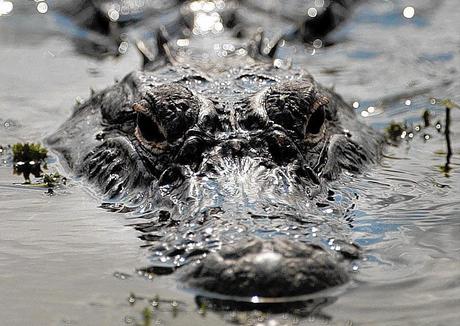
A Loxahatchee gator. Photo: Mark Randall / Sun Sentinel
by David Fleshler / Sun Sentinel
After decades as the unchallenged lords of the swamp, the alligators of the Loxahatchee National Wildlife Refuge will soon find themselves turned into prey.
A controversial alligator hunt has been approved for the western Palm Beach County refuge, a sweep of Everglades sawgrass, forest and prairie that runs west of U.S. 441 from West Boca up to Wellington. Hunting at night, permit holders will be allowed to use harpoons, spear guns, crossbows and other means to catch the alligator and then kill it with a bangstick, a pole that discharges a shotgun shell or bullet into the reptile’s brain.
The hunt, expected to begin in August, will allow a maximum of 11 hunters to kill a total of 22 alligators, a modest beginning for what supporters and opponents expect will be an expanded hunt in coming years.
Newton Cook, executive director of United Waterfowlers of Florida, which supports the hunt, said he expected competition for the few permits to be fierce.
“There will be hundreds of applications,” he said. “There’s a lot of really big gators in there that haven’t been hunted, and people want to go where the big gators are.”
Opposition to the hunt came from around the world, with the majority of more than 1,300 letters and emails to the U.S. Fish and Wildlife Service saying an alligator hunt was incompatible with the concept of a wildlife refuge.
Matthew Schwartz, executive director of the South Florida Wildlands Association, called the decision a mistake that catered to hunters who already had ample room near the refuge to go after alligators.
“It seems like a small number, 11 permits and 22 gators, but it’s opening the door to the activity itself,” he said. “It’s pretty easy for them to tweak these numbers and allow more hunting in a bigger area of the refuge. This is the last remnant of the northern Everglades.”
But the U.S. Fish and Wildlife Service, which announced the Loxahatchee decision as part of a general expansion of hunting at wildlife refuges around the United States, said hunting is a traditional activity that has long been allowed at wildlife refuges. An environmental review by the agency found the refuge’s alligator population was unlikely to be affected by a modest amount of hunting.
“Hunting and fishing are time-honored ways to enjoy the outdoors and teach people to value nature,” said Dan Ashe, director of the U.S. Fish and Wildlife Service. “Our National Wildlife Refuge System has millions of acres of public land and water to provide quality hunting and fishing experiences. We hope these expanded hunting and fishing programs will allow more Americans to experience this connection with nature.”
Permits will be issued by random drawing supervised by the Florida Fish and Wildlife Conservation Commission, working with the refuge’s staff. The hunt will run from Aug. 15 to Nov. 1, with hunting allowed only Friday and Saturday nights.
Cook, of United Waterfowlers, said opening up Loxahatchee to alligator hunting was essential to winning the support of hunters for the creation of a planned wildlife refuge north of Lake Okeechobee.
“Obviously, we are pleased with the final ruling and look forward to the first hunts this August,” he said. “This new hunting opportunity, along with the expansion of hunting on the St. Marks National Wildlife Refuge, will help solidify the sports community’s support for the proposed Lake Okeechobee Headwaters National Wildlife Refuge.”

